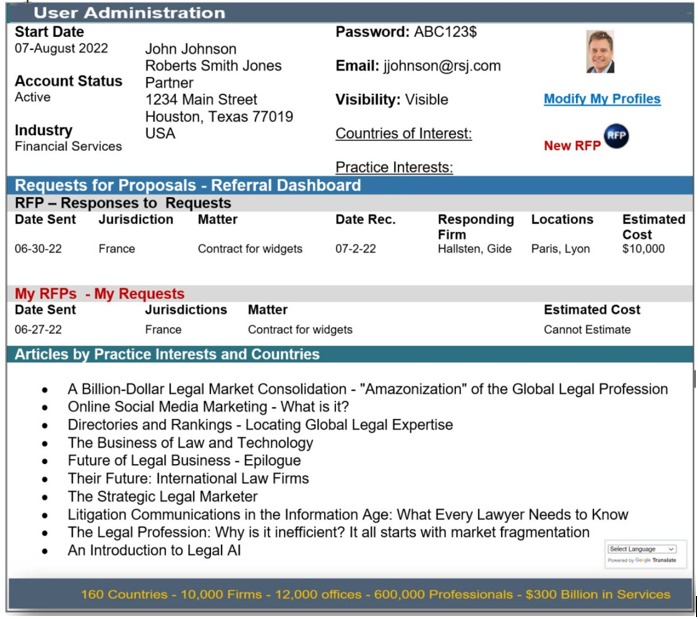Jon Lindsey - New York Founding Partner, Major, Lindsey & Africa
Jon Lindsey is the New York founding partner of Major, Lindsey & Africa. Over the past two decades, Jon has placed scores of partners and practice groups at many of the world’s top law firms and assisted firms in merger and branch office acquisitions. As the former global co-chair of the MLA’s Partner Practice Group, Jon helped to set strategy and coordinate the partner practice for the firm’s 25 domestic and international offices. He is the co-author of “Managing People in Today’s Law Firm” (Quorum Books, 1995) and the 2014 MLA “Lateral Partner Satisfaction Survey.” He gratefully acknowledges the contributions of his colleagues Robert Major Jr., Michelle Fivel, Ru Bhatt, Amanda Brady, and Greg Richter in the development of this chapter.
During the three and a half decades since the 1982 founding of
our firm — Major, Lindsey & Africa (MLA) — the legal recruiting and
staffing industry has undergone enormous changes; indeed, in many respects, it
has changed more than the legal industry it serves.
The Role of Legal
Recruiting and Staffing Firms
Legal recruiting and staffing firms make
professional placements for a variety of positions and professional roles at
client companies and law firms, either for permanent placement or for more
limited durations of time. They include:
· In-House
Legal Departments: in-house counsel positions, e.g., general counsel (GC),
corporate counsel, or legal secretary.
·
Law Firms: partner and associate candidates who typically work
exclusively with a single recruiter to identify firms that would be the best
cultural, financial, and practice fit.
·
Business Management: retained searches for firms’ business management
professionals, e.g., chief operating officer (COO), chief marketing officer
(CMO), chief strategy officer (CSO), chief financial officer (CFO), and
corporate legal department operations professionals.
·
Permanent: full-time employees, whether at law firms or in-house at
companies.
· Specialized/Temporary:
legal professionals for specific projects or on an interim and temporary-to-permanent
hire basis (both at companies and law firms).
Most of the scores of legal recruiting firms
in the U.S. have a small handful of recruiters in a single city; several have
offices in more than one city. Our firm is unique in having more than 200
recruiting professionals in more than 25 locations worldwide, including London,
Hong Kong, Tokyo, Singapore, Amsterdam, Sydney, Delhi, and cities across the
U.S. This provides the distinct advantage of having market information about
law firms, corporate clients, and practice trends globally rather than just for
a single city.
Why Use a Recruiter?
There are five main reasons that law firms and
companies utilize legal recruiters:
1. Attract
top talent: Top legal talent is difficult to find because those
professionals are usually not looking for new opportunities; one must “search”
for them, thus necessitating the role of legal recruiters and staffers.
2. Save
money: The cost of hiring mistakes often exceeds the annual salary of the
person hired. The fees for a legal recruiter are relatively modest in
comparison. A successful recruiter should find candidates of the highest
quality who match specific needs and efficiently complete the placement, making
the search cost effective.
3. Save
valuable time: Time spent by a company’s or firm’s internal team directing
a search is time lost on other important business tasks. Legal recruiting and
staffing by an outside professional saves valuable time, considerable effort,
and the associated costs of internal resources.
4. Minimize
hiring mistakes: The right fit is critical to business objectives and
company culture. Top-notch legal recruiters and staffing consultants who know
the legal market intimately are able to look beyond the resume, providing frank
assessments of potential candidates.
5. Ensure
that your offer is competitive: The market changes rapidly. Legal
recruiting and staffing firms should work with clients (companies or law firms)
to ensure the compensation package is competitive and will attract the right
candidates.
Law firm partners and associates utilize a
recruiter to assist in assessing the market of firms that might be a good fit;
to provide information about the firms’ cultures, finances, practices, and
other pluses and minuses; to serve as an intermediary throughout what can
sometimes seem like an interminable recruiting process; and (in appropriate
instances) to help in negotiating aspects of the lateral’s compensation
package.
For partners, this process often includes the
recruiter’s assistance in fashioning a business plan to help firms evaluate how
a lateral can be accretive and help advance the firm’s long-term strategic
goals. An experienced recruiter familiar with client firms can also provide
critical information about issues such as capital contributions, pension
arrangements, partner compensation systems,[2] lease obligations, potential client
conflicts, and the like.
As noted in MLA’s most recent Lateral
Partner Satisfaction Survey,[3] partners who used the services of a
recruiter when changing firms had significantly higher rates of satisfaction
with their move than those who did not, especially when the search consultant
had:
· Analyzed
the fit between their client base/practice area and the firm’s;
· Acted
as intermediary or otherwise assisted in negotiations; and
· Provided
detailed information about potential firms.
Partners who worked with recruiters were also
more likely to review a firm’s financials before moving than those who moved
without assistance.[4] For both groups, however, the
percentage doing thorough due diligence before investing their professional
future and their capital in a new partnership was shockingly low.
Keeping the Keepers III: Mobility &
Management of Associate Talent, a national study and report of law firm associate hiring and
retention from 2006–2011, includes findings from more than 22,000 associate hires
and more than 17,000 associate departures. The report found that very few firms
anticipated changes in non-partner recruiting budgets or the number of
administrative staff who are dedicated to non-partner recruiting in the near
term. At the same time, however, a significant number of participating law
firms (56 percent) reported an expected increase in lateral hiring.[5] The report’s supplemental study of
85 law firm administrators found that search firms, internal referrals, and
online searches or solicitations initiated by the firm accounted for the
largest percentage of lateral hires within the last two years. The majority of
firms reported that law school job postings, external referrals, and
unsolicited write-ins each accounted for 10 percent or less of lateral hires.[6]
Law firms recognize that while recruiting fees
are not immaterial, search consultants can add enormous value in helping them
add senior laterals who can in turn add significant revenues, expand the firm’s
talent and client bases, and bring new energy and vitality. For that reason,
lateral partner hiring is more competitive than ever — e.g., in a recent
survey, 96 percent of law firm managing partners said they viewed lateral
partner recruiting as a primary growth strategy.[7] To be successful in implementing
that strategy, firms need to be nimble, creative, flexible, decisive, and
visionary (read more specific suggestions for law firms in “To Compete for
Laterals — Linger Not, Partners”).[8] In short, law firms and their
management teams have concluded that employing the services of savvy recruiting
professionals is a productive allocation of firm resources.
Law Firm Business Management Recruiting
This focuses on business management roles at
firms, e.g., chiefs and directors of various verticals such as operations,
finance, business development, marketing, technology, pricing, and more. The
prominence of these professional management positions within law firms has
expanded dramatically in recent years. For example, as clients continue
pushing for alternatives to the billable hour and greater accountability as to
how their law firms manage and staff their matters, there has been a continued
interest in the pricing of legal work. Perhaps more importantly, though, is the
realization that “pricing” does not exist in a vacuum, but instead is
necessarily dependent upon solid legal project management (LPM) and more
sophisticated practice management. Consequently, there has been an explosion in
the demand for pricing and practice management professionals who play critical
roles in pitching, pricing, and ensuring efficient delivery of the work.[9]
In order to remain competitive in an increasingly challenging economic
environment, firms continue to recognize the value professional managers and
administrators bring to the firm; with that value comes increased
responsibilities and corresponding compensation. These professionals play a
pivotal role in the success of law firms; thus, the support from experienced
recruiters is paramount to finding the right match in candidates for those
positions.[10]
General Counsel and Other In-House Positions
These are very different from law firm
associates, partners, and business management roles. They, too, benefit greatly
by utilizing legal recruiters for a range of levels in corporate law departments
and across various legal disciplines, whether generalist or subject-matter
specific. Searches range from positions at start-ups with fewer than 10
employees to the GC search at Fortune 500 companies and everything in between.
Adept legal recruiters help find and place the best-matched candidate for each
role, depending on the specific needs of the corporate legal department.
Since our firm began in 1982, in-house law
departments have become an increasingly attractive destination for law firm
lawyers, including partners. This growing popularity compounds the barrage of
applications by interested candidates, which are effectively managed by legal
recruiting and staffing firms well versed in the arena.
Typically, the CEO, VP of human resources,
chief human resources officer (CHRO), or other senior executive at a company is
faced with the task of recruiting a first or new GC. Thus, it is hugely
beneficial to defer to well-equipped legal recruiters with high-caliber
expertise and experience who work on a daily basis with senior-level lawyers.
This is especially true when the hiring authority has not previously faced such
a task frequently, if at all. Consequently, senior executives routinely seek
the advice of legal recruiting firms to determine whether it makes economic
sense to hire an inside lawyer based on a company’s legal workload.
Many legal search consultants have graduated
from top law schools and worked in the law departments of some of the nation’s
largest and best-managed corporations. This experience provides an unmatched
depth of knowledge and contacts. Established recruiters with an extensive track
record of successful searches for senior in-house lawyers also have the
advantage of a longitudinal view of the candidate market. This knowledge can
provide a valuable and long-term perspective on each slate of candidates for
in-house legal departments.
Temporary Project Staffing
This previously consisted primarily of support
for document review, M&A due diligence work, and project staffing for
maternity leave, offshoring, and onshoring. Today, however, it encompasses a
more substantial portion of the legal landscape. After the 2008 recession,
global demand for legal services contracted, and it has taken several years to
get back to a baseline. Now, the legal market is regaining strength as it
continues to expand into new and emerging markets worldwide.[11]
While global growth is on the uptick, BigLaw
has been and will continue to give up market share to new entrants to the legal
services market. Firms such as Axiom, Laterally, Thomson Reuters’ Legal Managed
Services, and MLA’s own highly specialized, temporary legal staffing solutions
provider, the Solutions Practice Group (SPG), are capturing increased market
share and will continue to have a major influence on how legal work will be
performed and disaggregated. Major consulting firms are also reentering the
legal market and looking to capture some of this revenue.
“Since the recession, businesses across the
country have been pushing their employees to do more with less,” explains Inside
Counsel’s Ashley Post, regarding why temporary staffing has become crucial
for companies, in Strategies for Leaner Legal Departments: Part 1.
She adds, “Members of corporate legal departments have encountered the same
challenge. Facing heightened performance expectations and heavier workloads,
in-house lawyers and their staffs have had to alter their workplaces to conform
to leaner budgets — all while maintaining productivity and excellence.”[12]
Law firms are still learning how to
effectively use the temporary staffing model, as described by Law360 reporter
Erin Coe in 5 Mistakes Law Firms Make with Temp Lawyers:
Firms are increasingly
relying on temporary attorneys to scale up legal teams on large matters while
controlling costs for clients, but experts say they could take more initiative
in offering these lawyers as a staffing option when pitching for business and
could improve how they integrate them into the legal team.[13]
Coe includes perspective from MLA partner and
global head of MLA’s In-House and Solutions Practice Groups, Gregory Richter,
who said: “Big firms have to be mindful that disaggregating workloads is
something clients will demand of them. Clients want different price points for
different levels of work and different people delivering that work. Firms have
to think outside the box and do things differently in this new-normal
environment we are in.”[14]
MLA launched its Solutions Practice Group with
the goal of finding ways for law firm and corporate leaders to meet evolving
needs with appropriate staffing and up-to-date solutions. The methodology and
service makes it easier to find highly-qualified lawyers and legal
professionals for substantive assignments on a cost-effective, contractual
basis. A partnership with the SPG and others in this space provides corporate
and law firm clients with the ability to maintain quality of work while
enabling it to better manage staffing needs thus increasing efficiency and
profitability. Staffing arrangements in this area include long-term, on-site
temporary placements; flexible work arrangements; and project staffing for peak
periods or interim needs.
Whether the position is at a law firm or
in-house at a company, legal recruiters and staffers guide firms and companies
to choose the ideal candidate for future business success. The truly adept
legal recruiting and staffing firms are those that are also prepared to adapt
to change and are skillful at doing so.
Changes to the Legal
Landscape Affect Recruiting
Supply and demand accounts for a more competitive
legal job market. While the 2008 recession certainly took away legal positions,
law students still continue to graduate and look for jobs.
“We are paying the price for having more law
schools produce more graduates at a time when demand for legal services has
slackened and the landscape has changed,” explains Robert A. Major, Jr., MLA’s
founding partner.[15] “As
the differential grows between supply and demand, the ‘price’ goes up, and, in
a recruiter’s world, that price is quality of resume and the closest match
possible between what a candidate offers and what a client requires.”
Specific to the in-house world, there has also
been an increased interest in and popularity of in-house positions.
“There are many reasons stated for the rising
attraction of in-house practice,” explains Major. “Some relate to the
deteriorating lifestyle found in the firms: the grim billable hour demands; the
never-ending pressure to bring in business; client conflicts; ‘prima donna
fatigue;’ and the feeling that one is being brought in as a lawyer to ‘clean up
messes,’ rather than advising on a strategy and course of action that won’t
result in messes to begin with.”[16]
Major also listed several perks of going
in-house: developing a close relationship with a single client; knowing that
your contribution leads to long-term impacts; being part of a team that in many
cases creates an instantly identifiable product; strengthening management and
teamwork skills that would not otherwise be utilized; and being exposed to a
larger variety of legal issues. These other skills, which in a law firm would
only be used on an infrequent basis, can help lawyers evolve into other roles
within an organization, such as business development, sales, marketing, or even
as CEO.[17]
Of course, this is hardly to say that working
as an in-house lawyer is preferable to working at a law firm; that depends on
the individual. Again, this is where an experienced legal recruiter can guide
candidates and clients toward the best match.
The Influence of
Technology
Technology directly impacts the legal industry
at large and thus legal recruiting and staffing. Perhaps the most significant
advancement has been the global connectivity provided by the Internet, email,
and social media.
“Years ago when we recruiters relied primarily
on the telephone, the mode of communicating with candidates put a premium on
brevity,” explains Major in Why Didn't I Get a Job Interview? I'm the
Perfect Fit... in his recent post to In Brief. “If asked to provide
a detailed explanation of a job opportunity, you were forced to severely limit
the number of candidates with whom you would speak on a daily basis. … However,
the advent of websites and email changed that.”[18]
Major also adds that the ever-increasing
amount of information on the Internet has provided a lot more “noise” for
clients and candidates alike. “What has not changed, but become more essential,
is the clients’ and candidates’ need to work with highly qualified, savvy,
knowledgeable legal recruiters and staffing professionals. Technology will
continue driving changes to the legal market, and the successful legal
recruiting and staffing professionals will always need to adapt to the oncoming
wave of technological advancements.”
“In our search-optimized, app-laden world,
anyone with access to the Internet can get a decent snapshot of available options
in a given market,” explains Michelle Fivel, a partner in the Associate
Practice Group of MLA’s Los Angeles office, and Ru Bhatt, a managing director
in the Associate Practice Group of MLA’s New York office.[19] As
this generation of lawyers is more technologically savvy than any of its
predecessors, it becomes apparent why creating greater access to both openings
and candidates is enticing. However, simply sending in a resume to an online
database will not get a candidate in the door.
“Unfortunately, the process of lateral
movement is not that simple,” said Fivel and Bhatt, as there are numerous additional
factors to consider, including the unknowns that only a trusted advisor can
identify and address for all parties involved.”[20] Posting
jobs online is passive and will not yield the same results as a good recruiter,
one who is familiar with the firm’s needs regarding a new candidate. For
instance, the ideal candidate might not even be actively searching for a new
job. A recruiter, on the other hand, knows who is working where and can get
ahead of the game by actively finding these lawyers. “The waiting game isn’t
aggressive enough because targeting only those active job seekers can delay
finding the perfect fit, costing money in missed business opportunities for the
firm.”[21]
Technology can be a useful tool for an
experienced legal recruiter, but in the same way that it cannot replace
high-level professionals who are lawyers, it cannot (at least for the
foreseeable future) replace legal recruiting and staffing professionals.
Conclusion: Legal Recruiting and Staffing Are More Significant
Than Ever
Change is in the air,
but certain constants remain:
·
Nearly half of 85 law
firm administrators in a recent survey reported an increase in alternative
career path/non-partner track lawyer recruitment and temporary lawyer
recruitment.[22]
·
Alternative business
solutions have forced the legal industry to take a hard look at how it provides
high-quality, cost-effective, efficient legal services.
·
Law firms are
embracing the non-partner track and other staffing alternatives, and legal
recruiters and staffing firms are specializing in order to provide those
options as well.
·
Law firm partners
faced with multiple options increasingly rely on professional counsel from
recruiters with market intelligence in order to make the most informed choices.
Legal roles in firms
and corporate legal departments have always been competitive. However,
increased supply and demand and the global connectivity provided by technology
make it essential for companies and law firms alike to work with legal
recruiting and staffing experts to navigate the continually changing legal
landscape.
[2] Jeffrey A. Lowe, 2016 Partner
Compensation Survey, Major, Lindsey & Africa, 2016, https://www.mlaglobal.com/publications/research/compensation-survey-2016.
[3] Jon Lindsey & Jeffrey A. Lowe, Lateral
Partner Satisfaction Survey, Major, Lindsey & Africa, 2014, http://www.mlaglobal.com/~/media/Allegis/MLAGlobal/Files/Articles/LateralPartnerSatisfactionSurvey_2013_MLA_Web.pdf.
[4] Id. at 42.
[5] Keeping the Keepers III: Mobility
& Management of Associate Talent, Major, Lindsey & Africa
& The NALP Foundation, 2014, at 16.
[6] Id. at 17.
[7] LexisNexis & ALM Legal Intelligence,
Oct. 2012, at 21.
[8] See Jon Lindsey & Robert
Brigham, To Compete for Laterals – Linger Not, Partners, Nat.
L. J. (Dec. 8, 2014), http://www.nationallawjournal.com/id=1202678232309/To-Compete-for-Laterals-mdash-Linger-Not-Partners.
[9] These newer positions are typically at the
director and chief level, and include such titles as: director of pricing and
project management; director of pricing and profitability; director of
strategic pricing & analytics; director legal pricing, practice and
profitability optimization; director, global pricing and legal project
management; chief practice management officer; chief practice officer; and
department operating officer.
[10] Id.
[11] See, e.g., Jeffrey A.
Lowe, BigLaw 2017: A Look Ahead, Major, Lindsey &
Africa (Jan.13, 2017), https://www.mlaglobal.com/publications/articles/biglaw-2017-a-look-ahead.
[12] Ashley Post, Strategies for
Leaner Legal Departments, Part 1, Inside Counsel (Feb. 26, 2013).
[13] Erin Coe, 5 Mistakes Law Firms
Make with Temp Lawyers, Law360 (Aug. 22, 2014), http://www.mlaglobal.com/community/news/5-mistakes-lawfirms-make-with-temp-lawyers.
[14] Id.
[15] Robert A. Major, Jr., Why Didn’t
I Get a Job Interview? I’m the Perfect Fit… Major, Lindsey &
Africa (Oct. 7, 2014), https://www.mlaglobal.com/publications/articles/why-didnt-i-get-a-job-interview.
[16] Id.
[17] Id. See also David
Maurer, Law Firm to In-House: Things to Consider before Climbing
Mountains, Major, Lindsey & Africa (Oct. 23, 2014), https://www.mlaglobal.com/publications/articles/law-firm-to-in-house-things-to-consider-before-climbing-mountains;
contra Michael Sachs, Law Firm to
In-House: a Different Type of Mountain, but not Insurmountable, Major,
Lindsey & AFRICA (Nov. 11, 2013), https://www.mlaglobal.com/publications/articles/law-firm-to-in-house-a-different-type-of-mountain-but-not-insurmountable.
[18] Id.
[19] Michelle Fivel & Ru Bhatt, Don't
Click Through Your Career, Major, Lindsey & Africa (Oct. 2,
2014), https://www.mlaglobal.com/publications/articles/do-not-click-through-your-career.
[20] Id.
[21] Id.
[22] Supra note 4.





 Software
Software Law
Law Legal
Legal






